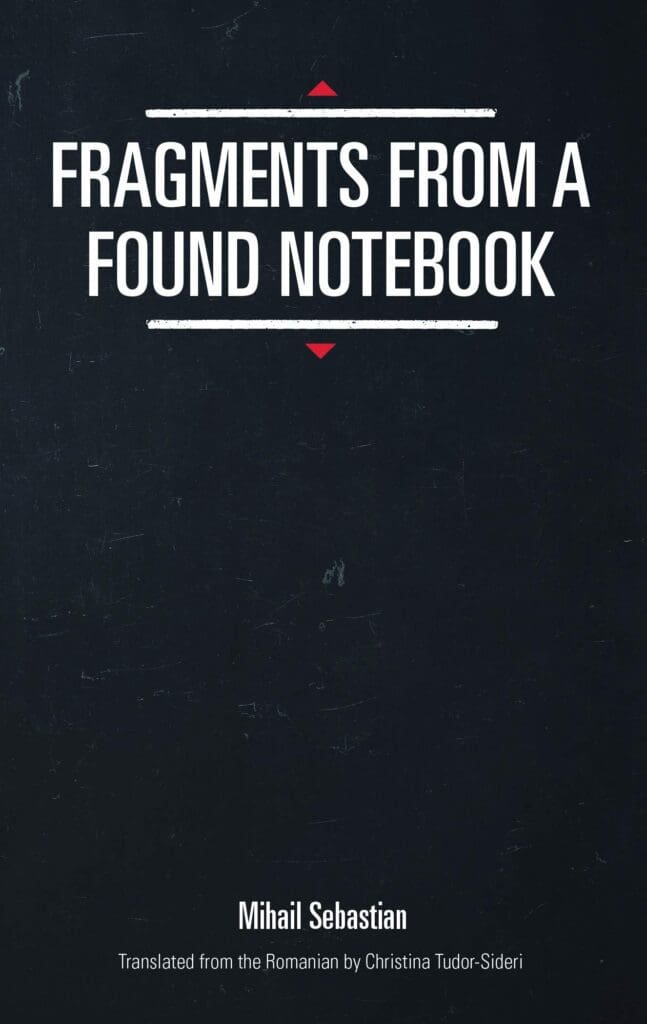In 1934, anti-Semitic laws in Romania banned author, journalist, and critic Mihail Sebastian from continuing any of his writing or teaching work. He was in his twenties then, and he no longer had printing or publishing rights under his own name. Yet this did not stop the young writer from a prolific career before his untimely death in 1945. His most famous and important work—Journal, 1935-1944: The Fascist Years—is a chronicle of his own life during that period and the increasing persecution he faced as a Jewish man in Romania.
Sebastian’s first book, Fragments from a Found Notebook (78 pages; Sublunary Editions), written in 1932 and translated for the first time into English by Christina Tudor-Sideri, is a short collection of excerpts, framed as pieces from a notebook the author apparently came across. (“I found in Paris, on the Mirabeau Bridge, a notebook with black, glossy, oil-cloth covers…,” Sebastian writes on the opening page. “There were exactly 126 pages—commercial paper—filled with small writing, streamlined, without erasures.”) Though less well-known than some of his other works, Fragments offers a unique glimpse into the early thoughts of a man who essentially had to erase his name to keep writing. It sets the stage for a corpus and a life wrought by questions of identity and authorship.
As its title suggests, Fragments is broken into small sections with various disconnected thoughts and musings that fill the narrator’s mind as he wanders the nighttime streets of Paris. Often, ellipses mark the beginnings of sections, implying an omission of previous thought or a slow emergence from silence. The voice of this narrator is distinct; he wonders about abstract ideas like miracles and beauty, then ambles on to consider something else. Like the figure of the flaneur, he seems to float through the city, detached from and untouched by its goings-on and likewise having no bearing on it himself. The effect is a text similarly detached, images and ideas hanging nebulously in the air for the reader to piece together.
But the narrator himself is not lost in that aimlessness. When asked by an interlocutor to tell a story about himself, the narrator responds:
I carefully circled around the last few months and found nothing, nothing worthy of telling, not even something mediocre and current.
An account that nevertheless does not sadden me, and especially does not rob me of the certainty that in the midst of this monotonous development of neutral facts, I remain an adventurer.
Certainly, if the flaneur is a wanderer of not just the city but also the mind, Sebastian’s narrator may, too, consider himself an adventurer into unknown cerebral lands, pushing his thinking beyond the constraints of normative morality, valuation, and meaning-making. “Just-un-just, good-bad, beautiful-ugly, moral-immoral; all these are without meaning, without truth, without depth,” he notes.
This interest in the deeper truth—in the “irreducible,” as the narrator calls it—returns us to the initial question of identity. What lies beyond such dichotomous labels as “good” and “bad,” “moral” and “immoral”? Is it these concrete demarcations which make each of us unique? Sebastian seems to think it is something else, a “very own sound” from each individual that allows one to “sense eternity” just within their reach. “I do not ask anyone to be good or bad, beautiful or ugly, angel or scoundrel,” he says. “I just ask them to be something that exists only once.”
In its ephemerality, Fragments from a Found Notebook is perhaps an answer to Sebastian’s own supplication for “something that exists only once.” It combines these elements of happenstance discovery and philosophical thought into a profound contemplation on not just who we are but why we are.


One thought on “‘Fragments from a Found Notebook’ by Mihail Sebastian: A Question of Identity”